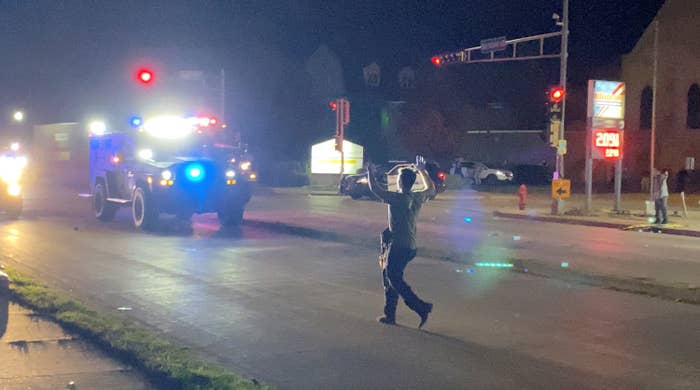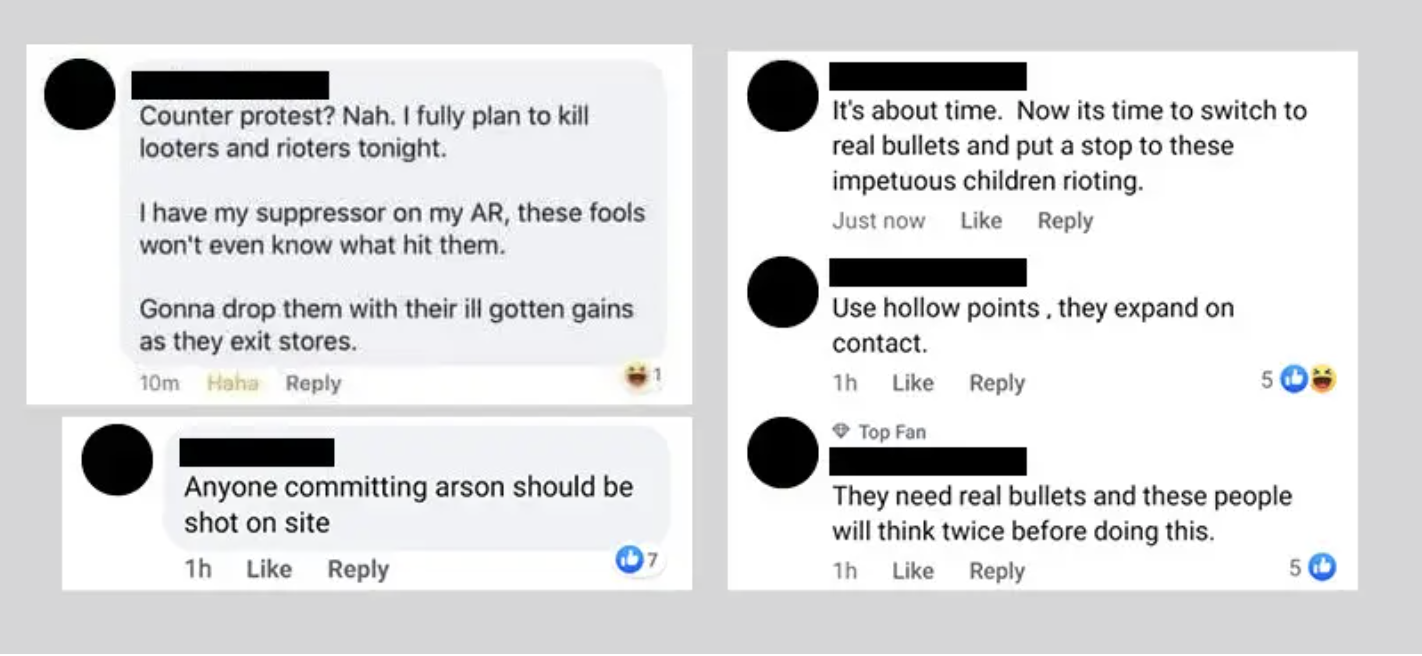
Four people are suing Facebook for its alleged role in enabling the violence that overtook the city of Kenosha, Wisconsin, in August.
The five-count civil complaint filed late Tuesday in a Wisconsin federal court argues that Facebook “empowered right wing militias to inflict extreme violence and deprive Plaintiffs and protestors of their rights” by providing a platform for the groups to recruit members and plan violence. It also accuses alleged shooter Kyle Rittenhouse, a follower of the fringe anti-government group “boogaloo,” and the “commander” of the self-described militia group Kenosha Guard of being part of a violent conspiracy to violate the constitutional rights of four Black Lives Matter protesters, including the partner of a man killed during the protests.
The suit, the first to accuse Facebook of abetting the violence in Kenosha, centers on the night of Aug. 25, when a Black Lives Matter protest in the Wisconsin city descended into violence. Two men were killed and another was shot after an alleged altercation with Rittenhouse, a 17-year-old who crossed state lines from Illinois and used a semi-automatic weapon. He is now charged with two counts of first-degree murder, and one count each of attempted homicide, recklessly endangering the safety of two people, and possessing a weapon while under the age of 18.
“There is a failure on the part of Facebook to act based upon warnings that result[ed] in armed militias violating state law and in the case of Rittenhouse going to a peaceful protest to violently repress and deter American citizens from engaging in their constitutional rights,” attorney Jason Flores-Williams, who filed the suit, told BuzzFeed News.
The plaintiffs are Hannah Gittings, whose partner was among those Rittenhouse allegedly killed; Christopher McNeal, a Black man and longtime resident of Kenosha; Nathan Peet, a Kenosha resident who attempted to assist one of the people allegedly killed by Rittenhouse; and Carmen Palmer, a Black woman who traveled to Kenosha from Milwaukee with her kids and a church protest group to march against racial injustice.
Earlier this month, BuzzFeed News reported that a Kenosha Guard event page encouraging attendees to bring arms to the city had been flagged 455 times by people on Facebook. CEO Mark Zuckerberg told employees the company’s failure to remove the event page was “an operational mistake.” BuzzFeed News also reported that Facebook did not remove the page after the shootings occurred, despite its claims to employees and the press to the contrary. The company later apologized for misleading the public.
This lawsuit, McNeal v. Facebook, Inc., follows a similar complaint filed in the wake of the deadly “Unite the Right” rally held in Charlottesville, Virginia, in 2017. Both lawsuits cite Reconstruction-era laws in attempts to hold white supremacists accountable for violent suppression of constitutional rights. The Kenosha suit also attempts to pierce the broad protections afforded to platforms like Facebook for user-generated content under Section 230 of the Communications Decency Act.
Do you work at Facebook or another technology company? We'd love to hear from you. Reach out at craig.silverman@buzzfeed.com and ryan.mac@buzzfeed.com or via one of our tip line channels.
Lin Wood, an attorney for Rittenhouse, called the suit "nonsense."
"As to Kyle Rittenhouse, this lawsuit is errant nonsense but may provide a golden opportunity for obtaining documents and sworn testimony from Facebook to bolster Kyle’s future defamation case against Facebook for falsely accusing him of mass murder," Wood told BuzzFeed News, referring to Facebook's decision to designate the incident a mass shooting and remove Rittenhouse's account and any content celebrating his actions. "Thus, I view the lawsuit as a blessing in disguise.”
Facebook and the other defendants did not immediately respond to a request for comment.
The complaint says the four plaintiffs were “terrorized, assaulted, harassed, and placed in so much fear when facing the business end of military grade assault rifles that they determined it was too dangerous to continue to protest.”
Palmer, one of the plaintiffs, told BuzzFeed News that people she described as white supremacists called her and her children racist slurs and pointed guns at them as they protested peacefully. She said that fearing for their safety, they decided to leave, but discovered their car tires had been slashed. As they stood near their car, a man riding in a truck with other heavily armed people pepper-sprayed them.
“It's not that these laws are really innovative or unique; it’s just that we didn't think that we would have to use them again in America."
“They were pointing guns out the window at us. I had my two teenage kids with me — they were scared to death, and I was scared. I almost had a panic attack,” Palmer said. “I shouldn’t have to live in fear just because I would like to express my rights.”
Two counts of the suit rely on infrequently used federal statutes designed to protect Black Americans from the Ku Klux Klan and other white supremacist groups. An 1871 law, often referred to as the “Ku Klux Klan Act,” made it a criminal offense to violently prevent someone from exercising their constitutional rights if the attack was racially motivated and premeditated.
The Kenosha suit is similar to Sines v. Kessler, a federal complaint filed in October 2017 by Charlottesville residents against more than 20 organizers and participants in the “Unite the Right” rally. That case is scheduled to go to trial in April 2021.
Mary McCord, legal director of the Institute for Constitutional Advocacy and Protection at Georgetown Law, said these types of suits are a response to the spread of heavily armed citizen groups and racial violence at protests. “If we continue to see militias and other sorts of white supremacist activity that results in injury to people of color and their allies, and that seems to be racially motivated, we could see a resurgence of civil lawsuits under these civil rights provisions,” she told BuzzFeed News.
“It's not that these laws are really innovative or unique; it’s just that we didn't think that we would have to use them again in America,” Flores-Williams said. “They are thankfully on the books for times like these."
The allegations against Facebook center around its failure to remove the Aug. 25 event titled “Armed Citizens to Protect our Lives and Property,” created by the Kenosha Guard. BuzzFeed News reported violent comments filled the page promoting the event, with people speaking about shooting protesters and celebrating the deaths of two people later that evening.

“Facebook, where most of the conspiring took place, failed to act to prevent this harm,” the suit says. “Despite over 400 reports of the Kenosha Guard’s event page and its call to arms, as well as the violent rhetoric throughout, Facebook failed to remove the page from its site until after several deaths, injuries, and extensive harassment occurred.”
Facebook previously said Rittenhouse did not RSVP to the Kenosha Guard’s event and did not follow its page. It remains unclear if he viewed the page or otherwise knew about the event.
The suit alleges the company violated federal law because it was aware of the planning of violence and failed to take action. It also alleges Facebook was negligent in failing to remove the Kenosha Guard page and its event.
“Facebook was [given notice] that something horrid was going to happen but failed to do anything,” said Flores-Williams. “They failed to act, and because they failed to act, good people were murdered and others were denied their fundamental rights to express themselves. Facebook provided the tools and platform for the militias to organize and execute their plans.”
The suit alleges that Kevin Mathewson, the “commander” of the Kenosha Guard and its page administrator, “planned, orchestrated, implemented, and took steps in furtherance of a conspiracy designed to threaten and terrorize US citizens, which ultimately resulted in murder and violence.”
The suit also names Ryan Balch and the boogaloo boys as part of the conspiracy. The day after the deadly encounter at the protest, Balch said in a Facebook post that he took on a “tactical advisement” role with a group of militia members, which included Rittenhouse, on the night of Aug. 25. Balch, a veteran of the Iraq War, said on Facebook that he did not behave violently, had at times helped Black Lives Matter protesters, and criticized local police for “abandoning” the protesters.
On Aug. 30, the Southern Poverty Law Center reported that Balch was “immersed in white supremacist propaganda” and that his social media accounts showed allegiance to the boogaloo, whose members have been linked to at least one alleged killing of a police officer. Balch told the SPLC that he "deeply and sincerely" apologized for social media posts that "were at times hurtful to innocent bystanders."
CORRECTION
Kyle Rittenhouse used a semi-automatic weapon and claims he received the gun after crossing state lines. This article incorrectly described it as an automatic weapon, and said he carried it across state lines.

